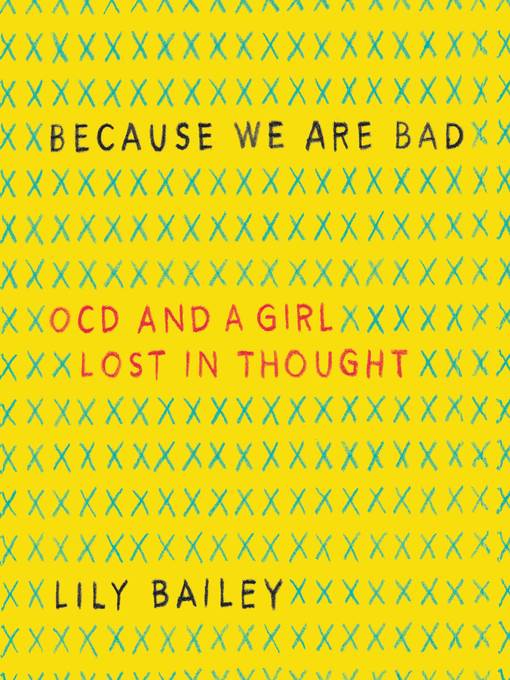
Because We Are Bad
OCD and a Girl Lost in Thought
وسواس داره و یه دختر گمشده
کتاب های مرتبط
- اطلاعات
- نقد و بررسی
- دیدگاه کاربران
نقد و بررسی

Starred review from February 5, 2018
London-based model and journalist Bailey offers an authentic and stunning account of her struggle with obsessive compulsive disorder in this beautifully-rendered memoir. Readers may initially wonder why the narrator often refers to herself as “we,” but will soon realize that the dueling voice inside Bailey’s head is an imaginary “friend” who reinforces intrusive thoughts, feeding into the author’s feelings of unworthiness. Bailey has a supportive family; though her parents divorce, they are committed to helping their daughter, who is diagnosed with OCD as a teen. Bailey does well in school (especially after receiving extra time for tests), but her interior dialogue is rife with worry and self-blame; it takes hours to fall asleep at night due to her analysis of intricate lists of perceived mistakes she’s made each day, along with her various routines (for example, tiptoeing into her sister’s room to see if she’s still breathing). Under the care of a psychiatrist, Bailey improves, but while attending college in Dublin she backslides and attempts suicide. Bailey is a vulnerable, vibrant, and courageous narrator. Daniel Lazar, Writers House.

February 1, 2018
For as long as journalist Bailey could remember, "me" was "we." When Bailey was a child, she created an imaginary friend that lived inside her head to cope with what she later found out was obsessive-compulsive disorder (OCD). Bailey went through every day of her life obsessing over the things she'd done that might be bad. Accidentally brushing against another person, speaking too loudly, and her grumbling stomach resulted in hours of thought. She spent countless afternoons and sleepless nights creating mental lists considering how bad or rude her actions were. Only by performing a set of routines for hours could she make up for her behavior. This made every human interaction extremely difficult because it led to potential bad behaviors and more compulsions. As Bailey became a teen and a young adult, her OCD spiraled out of control and she had to find ways to break through and cope with her fractured thinking. VERDICT Bailey's memoir is an insightful look into growing up with OCD and a great choice for readers of books such as Susanna Kaysen's Girl Interrupted. By transporting readers into her world, she makes understandable the urgent and debilitating obsessions of her experience.--Kristen Calvert, Marion Cty. P.L. Syst., Belleview, FL
Copyright 2018 Library Journal, LLC Used with permission.

February 1, 2018
A British model and writer's account of how she learned to live with obsessive-compulsive disorder.As a child, the author privately referred to herself as "we." However, the girl that "shared" Bailey's mind was no imaginary friend: she was the "other" who drove her to check on her sleeping sister several times a night, wash her hands to rawness, and mentally repeat elaborate "prayer[s]." She existed to ensure that Bailey carried out rituals as "protection against everything going wrong" and make up for all her real and imagined mistakes, from killing someone with a thought to spreading deadly disease. As Bailey grew up, her secret "other" became increasingly exacting and onerous: "she [was] a banshee...a spoiled child demanding the whole of me." By the time the author was an adolescent, her "double" made her recite long strings of letters in her head, each of which stood for the first letter of an action (such as staring) or a thing (such as bad breath) for which she sought retribution. Bailey finally revealed her list-making habit to a school doctor, who referred her to a psychiatrist named Dr. Finch. Intensive therapy helped the author free herself from her "other," whom she then "replaced" with her doctor. Determined to free herself from dependence on Dr. Finch, the author severed their connection and stopped taking medication after leaving England to attend college in Ireland. The result was a first term characterized by heavy drinking, shoplifting, and attempted suicide. Only after returning to London to face her demons and work through transference issues with her psychiatrist was Bailey finally able to find relief from her overactive mind and the underlying anxiety that had defined her life. In her courageous book, the author offers compelling insight into the pain and destructive power of OCD as well as the resilience of a young woman determined to beat the odds.A harrowingly honest memoir of profound psychological struggle.
COPYRIGHT(2018) Kirkus Reviews, ALL RIGHTS RESERVED.

March 1, 2018
Bailey is 16 when she is diagnosed with obsessive-compulsive disorder. I make lists of everything I've done that might be wrong, she tells her mother, explaining that she obsessively repeats them over and over to analyze them. She feels the need to be perfect, but the fact is that, since she was a little girl, she has felt she is bad. Not only her but the second Lily who lives in her head, who tells her what to do. I'm nothing without her, she confesses to her therapist. That will be put to the test when her friend suddenly leaves her. She is bereft but continues her obsessive behavior until her condition becomes unbearable, and she attempts suicide. In the wake of her attempt, she is institutionalized, but nothing seems to help until something?a support group?begins to make a difference. Bailey is unsparing in her well-written memoir of her struggles with OCD, giving readers an intimate experience of living with the disorder. Her account focuses much-needed light on a condition that demands to be better understood.(Reprinted with permission of Booklist, copyright 2018, American Library Association.)

























دیدگاه کاربران